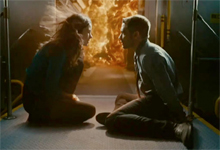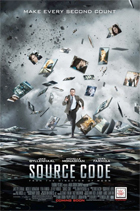Source Code
|  I have not checked, but I can only assume that there is probably a great deal of discussion and debate online regarding the exact manner in which the titular computer program in Source Code is supposed to work. Suffice it to say, the program is a classic macguffin--it needs no real explanation outside of its ability to set the plot in motion. Thus, you don’t need to know anything about theoretical physics or the malleability of the space/time continuum to enjoy Duncan Jones’s sophomore directorial effort, a sharp, engaging sci-fi thriller about a military project that allows a soldier to continually re-experience the final eight minutes of another man’s life in order to figure out who planted a bomb on a Chicago commuter train that killed several hundred people. The clock is ticking, as it always is in such movies, because the train bomb was just a warm-up and the bomber (whoever he or she is) is planning to set off a radioactive “dirty bomb” in downtown Chicago. I have not checked, but I can only assume that there is probably a great deal of discussion and debate online regarding the exact manner in which the titular computer program in Source Code is supposed to work. Suffice it to say, the program is a classic macguffin--it needs no real explanation outside of its ability to set the plot in motion. Thus, you don’t need to know anything about theoretical physics or the malleability of the space/time continuum to enjoy Duncan Jones’s sophomore directorial effort, a sharp, engaging sci-fi thriller about a military project that allows a soldier to continually re-experience the final eight minutes of another man’s life in order to figure out who planted a bomb on a Chicago commuter train that killed several hundred people. The clock is ticking, as it always is in such movies, because the train bomb was just a warm-up and the bomber (whoever he or she is) is planning to set off a radioactive “dirty bomb” in downtown Chicago.The soldier taxed with this mission is Lt. Colter Stevens (Jake Gyllenhaal), a veteran Air Force helicopter pilot who was serving in Afghanistan when he was drawn into the Source Code project. The exact nature of his involvement with the project is fuzzy, as Colter himself is not entirely sure of how he got strapped into the dark pod in which he finds himself or what exactly he is supposed to be doing. As Christopher Nolan did so masterfully in Memento (2000), screenwriter Ben Ripley aligns us with Colter by denying us the same information that he lacks; we are as confused and disoriented as he is and must rely on a computer monitor in which an army officer named Colleen Goodwin (Vera Farminga) instructs Colter on what he should be looking for and assuring him that all of his various questions and confusions are outside the scope of the mission. All that matters is finding the bomber, and each time Colter has eight minutes before the device detonates, meaning that he must suffer physical annihilation over and over again. Colter’s mission is also complicated by Christina Warren (Michelle Monaghan), the pretty, amiable woman across from whom he is sitting on the train. Colter is reliving the past via the body of a schoolteacher named Sean, who is friends with Christina, but perhaps more. Each time Colter is shot back in time, he begins at the same place in mid-conversation with Christina, which he must abruptly interrupt in order to ferret out the bomber’s identity, a difficult scenario given that he is on a train with hundreds of people, any one of whom may have planted the device. With each repetition, we get to know the characters on the train a little better, as Colter frequently confronts them in violent ways that would be impossible if he didn’t know that they only had minutes to live. Forced to deal over and over again with knowing that these people are going to die, Colter becomes determined to somehow save them, even as Goodwin and the program’s inventor, Dr. Rutledge (Jeffrey Wright), assure him that everything he sees and feels is a ghostly shadow of a past that is long gone and irretrievable. Colter’s dilemma is beautifully distilled in a poetic shot of him and Christina facing each other on the floor of the train while the bomb’s fireball--the inevitable harshly literalized--blooms toward them in agonizing slow motion. As science fiction has frequently shown us, surfaces are often deceiving, inventions often overstep their intended uses, and reality is more multifaceted than we like to think. Source Code takes its thriller premise and works it into an existential celebration of human determination and the resolute refusal to accept the status quo; when Colter rejects Dr. Rutledge’s assertion about the program’s limitations, he seems to will for himself a new dimension, even as Rutledge sinks into an almost cartoonish portrait of science run amok, sacrificing individual humanity for a perceived greater good that is little more than a mask for the scientist’s rampant ego. Director Duncan Jones, whose first film, Moon (2009), was also a tricky experiment in the sci-fi genre that rattled our preconceptions, is working in a more conventional, rather than pensive, thriller mode, but he tweaks the formula with both moments of dark humor and a surprisingly moving sense of tragedy that the film’s ending smartly turns into a fantastical scenario in which the end can actually signal a new and better beginning. Copyright ©2011 James Kendrick Thoughts? E-mail James Kendrick All images copyright © Summit Entertainment |
Overall Rating: 

 (3)
(3)


